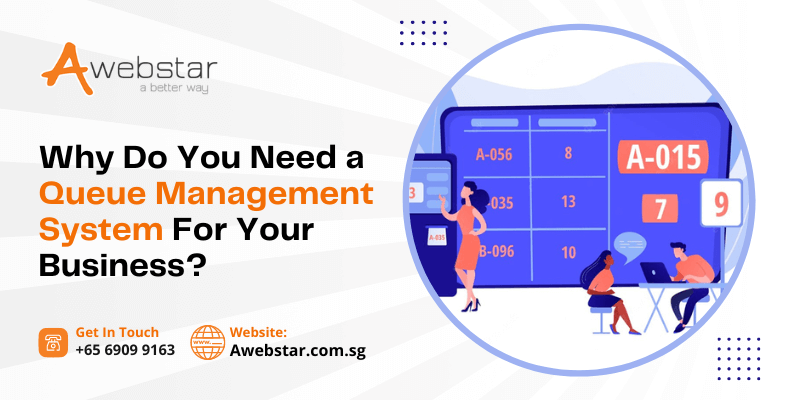
Queues are a common problem for businesses as they can lead to long wait times and frustrated customers. Customers are often willing to abandon a business if they experience long wait times or poor service. Deploying a Queue Management System can help businesses to overcome these problems by streamlining the flow of customers and reducing wait times.
It is a software tool designed to manage customer queues in retail, healthcare, government, and other industries. With features such as real-time data and analytics, self-service kiosks, and SMS notifications, a queue management system can provide customers with a more convenient and efficient experience. This leads to improved customer satisfaction and increased loyalty. Thus, helping businesses to stay ahead of the competition. In addition, a queue management system can help to reduce staffing costs and increase efficiency. Therefore, making it a beneficial investment for any business looking to improve its operations.
Key Features of a Queue Management System:
Online Booking:
Customers can book appointments or reserve their place in line through an online booking system. This allows them to plan their visits in advance, reducing wait times and increasing convenience.
Mobile Check-in:
Customers can use their mobile devices to check in for their appointment or place in line. It eliminates the need for customers to physically visit your business, reducing wait times and increasing convenience.
Real-Time Data and Analytics:
Queue management software provides real-time data and analytics on customer behavior and wait times. It allows businesses to identify bottlenecks, analyze wait times, and make changes to improve their operations.
SMS Notifications:
Customers can receive SMS notifications or updates through a mobile app, letting them know when it’s their turn to be served. It reduces frustration and improves the overall customer experience.
Self-Service Kiosks:
Customers can use self-service kiosks to check in or book appointments, reducing wait times and increasing efficiency.
Multi-Channel Support:
A queue management system can support multiple channels, such as walk-in, phone, and online bookings. It allows businesses to manage their customer queues from a single platform. Thus, reducing complexity and improving efficiency.
Customizable Wait Time Estimates:
An online queue management system can provide customized wait time estimates based on real-time demand. Thereby, allowing customers to plan their visits accordingly.
Dynamic Staffing Optimization:
With real-time data on customer demand, a queue management system can optimize staffing levels based on real-time demand. This helps businesses reduce staffing costs and improve efficiency.
Integration With Other Systems:
A queue management system can integrate with other systems, such as customer relationship management (CRM) and enterprise resource planning (ERP) systems. All this provides a seamless and unified experience for customers.
Significance of Queue Management System For Your Business:
Increases Efficiency And Productivity:
A queue management system helps to eliminate long lines and reduce wait times for customers. Thus, leading to increased efficiency and productivity for your business. With a queue management system, customers can be directed to available service points, and staff can be directed to the areas where they are needed most. It helps to improve customer flow, reduce wait times, and assure business efficiency.
Improves Customer Experience:
A queue management system provides customers with accurate wait time estimates, reducing frustration and improving their overall experience. Customers can also use self-service kiosks or mobile devices to check in, reducing wait times and increasing convenience. With a queue management system, customers can also receive SMS notifications or updates through a mobile app. Thus, letting them know when it’s their turn to be served.
Reduces Costs:
By reducing wait times and increasing efficiency, a queue management system can help your business reduce costs associated with staffing, training, and operations. With a queue management system, businesses can optimize their staffing levels based on real-time demand, reducing the need for overstaffing during slow periods. This can lead to cost savings for your business, freeing up resources that can be redirected to other areas.
Enhances Data Tracking And Analysis:
A queue management system can provide valuable data on customer behavior and wait times, allowing you to make informed decisions about your business operations. This data can be used to identify bottlenecks, analyze wait times, and make changes to improve the customer experience. With real-time data, businesses can identify patterns and trends that can be used to improve their operations and increase efficiency.
Offers Convenience:
With features such as online booking, SMS notifications, and mobile check-in, queue management software can provide customers with a convenient and stress-free experience. Such an appointment management system enables customers to book visits. Also, they can check in from the comfort of their own homes. It reduces the need for them to physically visit your business. Also, it increases customer convenience, leading to improved customer satisfaction and increased loyalty.
Winding Up:
In conclusion, a queue management system can provide numerous benefits for your business. It includes improving the customer experience, reducing costs, and increasing efficiency. Consider investing in queue management software to stay ahead of the competition and meet the needs of your customers. Whether you are in retail, healthcare, government, or any other industry, queuing software can help your business improve its operations and increase customer satisfaction.
Deploying a queue management system, such as QWaiting, can be beneficial for your business. It can help streamline customer flow and improve the customer experience. This can be achieved by reducing wait times, providing real-time information to customers, and enabling customers to join a virtual queue remotely. Additionally, it can provide valuable data and insights. These can help you optimize your operations and make informed decisions.















































